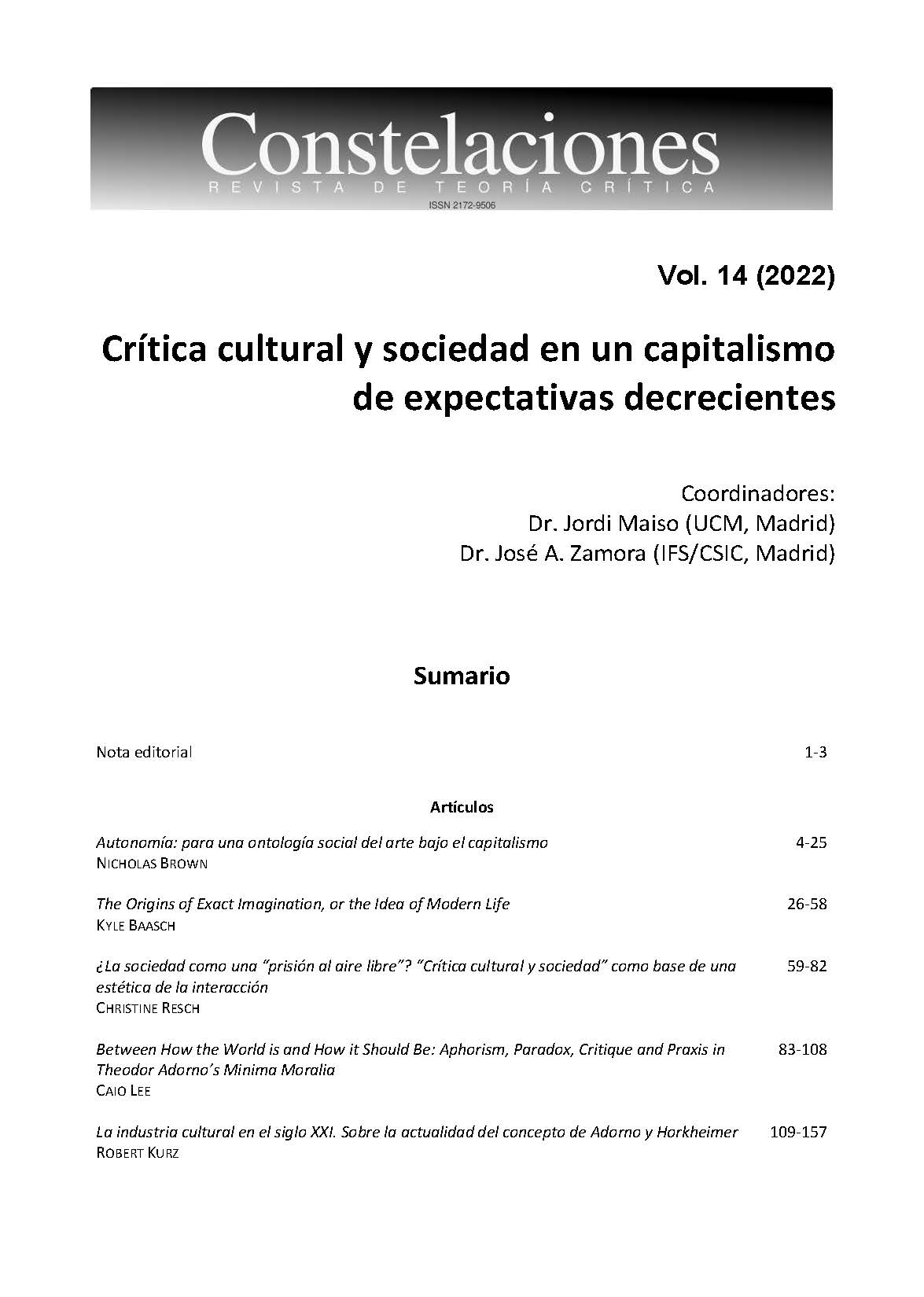Autonomía. Para una ontología social del arte bajo el capitalismo
Keywords:
autonomy of art, commodity-art, objecthood, form, culture industry, interpretationAbstract
“Works of art exist: how are they possible?” It is over a century ago that Lukács posed this question. But Lukács did not have to confront the “wholesale reduction of culture to a commodity”. This phenomenon, lamented on the left while the right celebrates “a more favorable attitude towards the commercialization of culture”. is nonetheless confidently affirmed by all sides, which “assert in the most ardent terms that art is, always has been, or has recently become, nothing but a commodity”. In a society like ours, claims to exist outside the circulation of commodities are rightly ruled out as hopelessly naïve: we are wise enough to know that the work of art is a commodity like any other. What is less clear is whether we know what we mean when we say it.
Downloads
References
BEECH, Dave (2015): Art and Value: Aet’s Economic Exceptionalism in Classical, Neoclassical and Marxist Economics, Leiden: Brill, 2015.
BOURDIEU, Pierre (1971): “Le marché des biens symboliques”, L’Anée sociolo¬gi-que, 22, 49-126.
CAMERON, James (2010): “Why the Na’vi Have Breasts!”,
https://uinterview.com/news/james-cameron-why-the-navi-have-breasts/
COWEN, Tyler (1998): In Praise of Commercial Culture, Cambridge: Harvard.
EAGLETON, Terry (2016): “Structurally Unsound”, Times Literary Suplement, June 8, 2016.
FRIED, Michael (1998): “Art and Objecthood”, en Art and Objecthood, Chicago: University of Chicago Press, 148-172,
HEGEL, G. W. F. (1970a): Phänomenologie des Geistes, Fráncfort: Suhrkamp.
HEGEL, G. W. F. (1970b): Vorlesungen über Ästhetik I, Fráncfort: Suhrkamp.
HEGEL, G. W. F. (1987): Jenaer Systementwürfe III, Hamburgo: Felix Meiner.
HORKHEIMER, Max y ADORNO, Theodor W. (1969): Dialektik der Aufklärung: Philosophische Fragmente, Fráncfort: Fischer.
HUTT, William Harold (1940): “The Concept of Consumers’ Sovereignty”, The Economic Journal, vol. 50, no. 197.
JAMESON, Fredric (1991): Postmodernism: Or, the Cultural Logic of Late Capitalism, Durham: Duke.
JAMESON, Fredric (2011): Representing Capital, Londres: Verso.
KANT, Immanuel (1974): Kritik der Urteilskraft, Fráncfort: Suhrkamp.
LARSEN, Neil et al., NILGES, Mathias, ROBINSON, Josh y BROWN, Nicholas (2014): Marxism and the Critique of Value, Chicago and Alberta: MCM?.
LUKÁCS, Georg (1974): Heidelberger Philosophie der Kunst (1912-1914), Werke, vol. 16, Darmstadt y Neuwied: Luchterhand.
LUKÁCS, Georg (1976): “‘Entäußerung’ ('Externalization’) as the central piloso¬phi-cal concept of The Phenomenlogy of the Mind”, The Young Hegel: Studies in the Rela-tions between Dialectics and Economics, Cambridge: MIT Press.
MARX, Karl (1969): Resultate des unmittelbaren Produktionsprozesses, Fráncfort: Neue Kritik.
MARX, Karl (2008a): Das Kapital. Kritik der politischen Ökonomie. Erster Band, Karl Marx y Friedrich Engels: Werke, vol. 23, Berlín: Dietz.
MARX, Karl (2008b): Grundrisse zur Kritik der politischen Ökonomie, Karl Marx y Friedrich Engels: Werke, vol. 42, Berlín: Dietz.
RUSHFIELD, Richard (2009): “James Cameron Reveals his Quest to Build More Perfect CGI Boobs”, https://www.gawker.com/5403302/james-cameron-reveals-his-quest-to-build-more-perfect-cgi-boobs
Downloads
Published
How to Cite
Issue
Section
License
Copyright (c) 2022 Nicholas Brown

This work is licensed under a Creative Commons Attribution-NonCommercial-ShareAlike 4.0 International License.
Authors who have publications with this journal accept the following terms:
1. Authors will retain their copyright and grant the journal the right of first publication of their work, which will be simultaneously subject to the License of recognition of Creative Commons CC BY-NC-SA 4.0 that allows third parties to share, redistribute and adapt the work provided it is for non-commercial purposes and its author and first publication in this journal is indicated.
2. Authors may adopt other non-exclusive distribution license agreements for the version of the published work (e.g., depositing it in an institutional electronic archive or publishing it in a monographic volume) provided that the initial publication in this journal is indicated.
3. Authors are permitted and encouraged to disseminate their work via the Internet (e.g., in institutional telematic archives or on their website) before and during the submission process, which can produce interesting exchanges and increase citations of the published work. (See The Effect of Open Access).
Data confidentiality
1. Constelaciones. Revista de Teoría Crítica guarantees that the data you send us will only be used to meet the requests made in this message.
2. Your data will not be passed on to third parties.
3. You may request that your data be removed from our records at any time.





